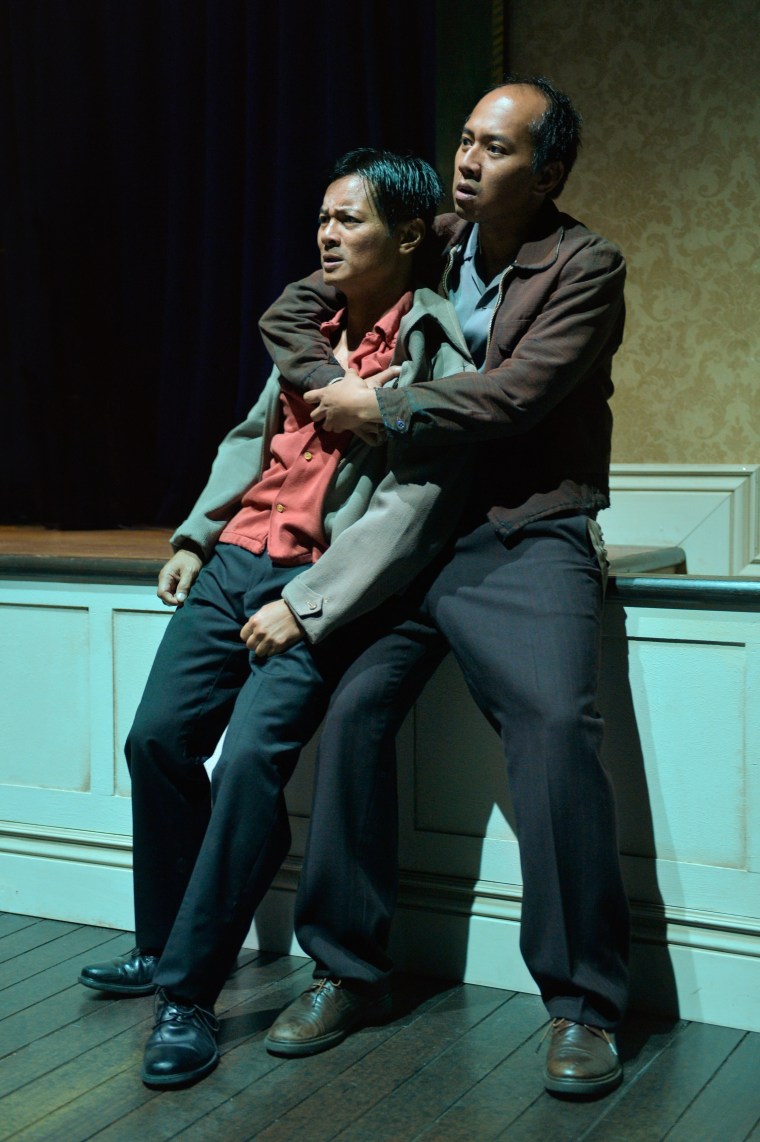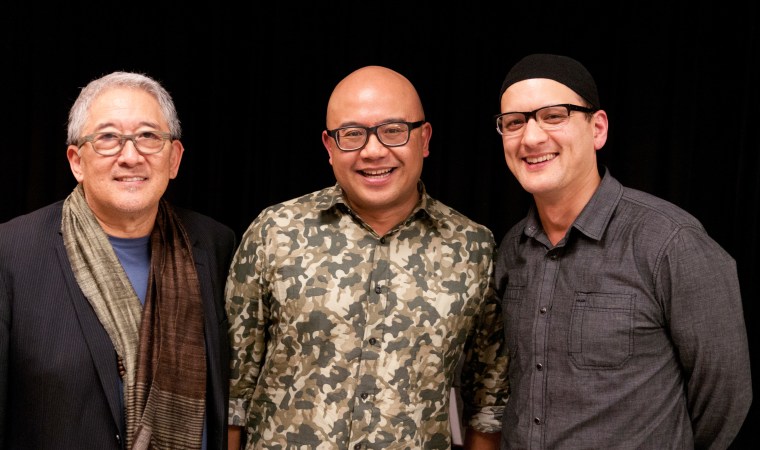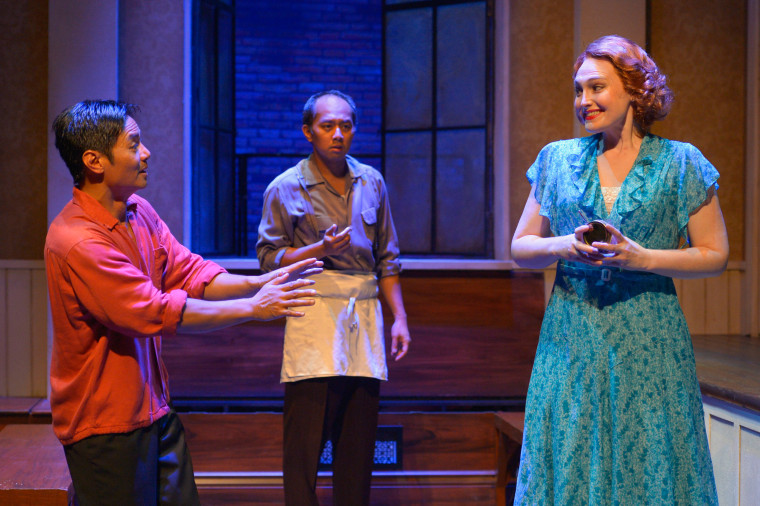Award-winning writer Lysley Tenorio had only imagined the tale of two Filipino-American immigrants in the 1930s whose lives were shaped by a racist history culminating with their eviction from San Francisco’s legendary International Hotel in 1977.
When the American Conservatory Theatre's artistic director, Carey Perloff, got a hold of Tenorio's short story collection "Monstress," which contains the I-Hotel story, that's when Tenorio's fiction came to life on stage.
But Perloff didn’t realize what a breakthrough narrative "Remember the I-Hotel," with a love story between two men, would be for a mostly-conservative Filipino immigrant community.
“Like any wonderful artist, [Tenorio] imagined these characters and what it would have been like for two people to survive,” Perloff told NBC News. “So he imagined Nado as a closeted gay man filled with longing for [Vicente], who he then takes care of for his whole life but who isn’t his lover, and in doing so, asks a lot of very beautiful questions about the nature of survival, friendship, and betrayal.”

Tenorio, who currently resides in Rome as the winner of the Roma Prize in literature given by the American Academy of Arts and Letters, said he was aware that his story had somewhat of a taboo element for culturally traditional Filipino families. But he saw that as the story’s strength, as well.
“First and foremost it's a story about two men—Fortunado and Vicente—and without their relationship as an emotional focus, the story wouldn't exist,” Tenorio said in an email to NBC News. “The setting of the I-Hotel and the eviction itself enriched and deepened their relationship, and the gay themes of the story as well.”
“I think a lot of those stories didn’t come out because it was a taboo.”
The more common narrative of Filipino immigration to America has been the story of how a mostly male group of immigrants arrived in California. Men outnumbered Filipino women, 10-1, as their arrival was intended to fill a labor need, and not to allow the Filipinos to lay down roots in the U.S. The situation worsened when a backlash against Filipino men dating white women brought on anti-miscegenation laws. That, in turn, stifled the creation of Filipino families and left many Filipino men to live their life in bachelor societies.
In art and history, the story of the bachelors had been mentioned, but rarely seen as the main focus of a complex love story.
“Mainstream history is told and written by the dominant culture,” Tenorio said. “Two Filipino men who came to the States in the '30s—one of whom is gay—would be on the perimeters of that culture which is why, I believe, their stories are seldom heard.”
Tenorio immigrated to the U.S. in the early '70s as a young boy with his family after the Immigration and Nationality Act of 1965 lifted quotas against immigrants. He was educated exclusively in the U.S., and while he himself is gay, insists that’s not why he wrote the story.
“Really, that was the best relationship to write against that [I-Hotel] backdrop,” Tenorio said. “I write straight characters too, for similar reasons.”

Tenorio’s story of the love triangle between Nado and Vicente, the two baggage porters in an upscale hotel, and a fellow hotel service worker, Althea, has been adapted for the stage by veteran Japanese-American playwright Philip Kan Gotanda, who chose the I-Hotel story from Tenorio's book to present.
“It was a world I thought I knew well, and the older men and their story,” Gotanda told NBC News.
As a young law student in San Francisco, Gotanda said he remembered the I-Hotel story of the struggle of SRO (single room occupancy) tenants to stave off developers and eviction. But he also grew up in Stockton, California, and knew the Filipino-American community there.
He also knew the community had its secrets.
“You didn’t talk about being gay. Gay people didn’t exist as far as most communities were concerned,” Gotanda said. “I think a lot of those stories didn’t come out because it was a taboo.”
In preparation for the A.C.T. staging, Perloff said the actors were aware the play would be eye-opening. “They were very brave to go the distance,” Perloff said of the cast. “Jomar Tagatac, who plays Nado, was worried at the beginning [that] the audience [would] condemn him for his behavior, but when you put a three dimensional character on stage and they’re so real, then we watch their behavior with empathy even when they don’t always behave the way we wish they’d behave.”
Along with the one-act “Remember the I-Hotel,” another Tenorio story, “Monstress,” has been adapted by Sean San Jose. A farcical romp in the world of low-budget sci-fi/horror B-movies, "Monstress" is a more modern story of Filipino immigration and how dreams don’t always end up the way people hope—in the movies or in real life.

Both plays also work as symbols honoring San Francisco’s Filipino community during Filipino-American History month, and will be staged through Nov. 22 at A.C.T.’s Strand Theatre, a refurbished movie house a block from 6th Street, which is still a hub of Filipino life in the city’s South of Market.
Perloff said A.C.T. hopes to do more with the community and use the new stage to involve Filipino youth, and to bring more diverse stories to audiences in the city.
For now, Tenorio, who has begun work on a novel, feels the collaboration from prose to stage has been a success.
“I'm extremely happy with the adaptation, and incredibly honored that Philip Kan Gotanda saw the dramatic possibilities in it,” Tenorio said. “Given the parameters of the play—an hour-long one-act—Philip managed to craft a beautiful and moving story about two men who, in a world where they have so little, find each other. The politics, while present, remain primarily in the backdrop, where they belong.”
